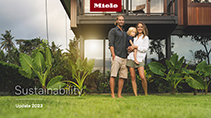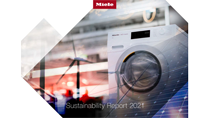Press releases
Repair, Refurbish, Recycle: Miele launches international pilot projects
Questions & answers on circularity at Miele
The future is circular. Miele is setting out and developing its first concepts for products in the circular economy.
What does circularity mean?
Circularity means reusing products and materials over and over again and thus keeping them in circulation. In English, the term circular economy is commonly used. The concept of the circular economy can be traced back to the masterminds behind Cradle to Cradle and the Ellen MacArthur Foundation, among others. According to them, it is a system ‘in which materials never become waste and nature regenerates itself.’ To achieve this, processes such as maintenance, reuse, refurbishment, remanufacturing, recycling and composting are used.
Why is circularity so important?
The natural resources on our planet are limited. Our economic system has so far been characterised by linear processes - we produce, buy, use and dispose of objects. So far, less attention has been paid to the end of life and aspects such as recycling or reusing products. A transformation from a linear to a circular economy would reduce the use of new resources in particular. In this way, circularity contributes to slowing down climate change, species loss and other negative impacts. Circular economy supports a sustainable future.
What are the benefits of a circular economy?
Circularity has both environmental and economic benefits: Basic materials for metals and plastics such as iron ore, coal and crude oil do not grow back - and at the same time we are striving for economic growth. So, if we do nothing, there will inevitably come a point when these resources will be much scarcer than they are today or will be used up completely. This will also have an impact on our business activities: Scarce resources will influence material prices and availability on the market. Other effects such as rising CO2 taxes on materials will be added to this, which we can counteract with CO2-reduced materials and circular solutions. Conserving resources is therefore both a contribution to the preservation of our planet and an economic necessity for companies.
How does Miele implement circularity?
In the circular economy, there are so-called R strategies - these are the Refuse, Rethink, Reduce, Reuse, Repair, Refurbish, Remanufacture, Repurpose, Recycle and Recover approaches. Some of these offer Miele, as a manufacturing company, the greatest leverage, e.g. Refurbishment, Repair and Recycle. Miele has incorporated these into its sustainability strategy and is intensively examining how they could be implemented in practice. We have therefore launched the first pilot projects to delve deeper into these topics, because: We are still at the beginning of a long journey here.
What pilot projects is Miele running?
Miele is running several pilot projects:
An extensive refurbishment project has been running in the Netherlands since 2022: this involves Miele washing machines being refurbished, i.e. checked, repaired and cleaned and then sold to interested customers with the ‘refurbished’ label. (see press release no. 122/2023: Miele increases commitment to Circular Economy and gives washing machines a second lease of life) The refurbishment of high-quality electronics in Germany by a specialised company fits in with the repair strategy. The electronics come from washing machines that are not suitable for refurbishment. The electronics are sold to consumers and professional companies, who reinstall them as repair replacements.
Since July 2024, Miele has also been offering refurbished electronics instead of new spare parts in some European countries via its own customer service and service partners. The offer initially includes 12 common electronic controls and will be successively expanded.
In another part of the project in the Netherlands, the detergent dispensers are removed from washing machines, which are well suited for recycling due to their material composition. The plastic material is separated and sent to a recycling company where it is processed into granulate. Miele uses this material to research quality and potential applications for the future.
The cast-iron bearing crosses and weights also come from the Dutch washing machines and are melted down again in the Miele foundry at the headquarters in Gütersloh. Almost 100 per cent of production there comes from recycling.
Miele is also involved in various research projects: As part of the ‘it's OWL’ innovation cluster, scientific institutes and companies are working together in the ‘Sustainable Lifecycle Engineering’ project, or SLE for short, to develop a holistic system model that makes sustainability effects transparent in the long term. The ‘ZirkuPro’ research project focuses on intelligent technical systems that are intended to contribute to the creation of holistic, circular products.
What has Miele achieved so far?
For over 125 years, Miele has stood for high-quality, durable materials and good repairability. These are ideal conditions for making Miele appliances even more circular. Miele has already achieved its first concrete successes. For example, the packaging of the Complete C3 now does without the usual polystyrene. It has been replaced by a moulded fibre material made from recycled material. In the laundry care sector, 30 per cent less material was used in the base module of the tumble dryer following a systematic redesign and the use of a new, award-winning foaming technology. At the same time, the use of recycled material in the lid of the module has further reduced the need for new plastic - all while maintaining the same high performance and service life.
Does Miele manufacture circular appliances?
The manufacture and series production of a completely circular domestic appliance is still a long way off. However, Miele is taking the first steps in this direction and has developed a concept study of a circular vacuum cleaner, which Miele is presenting at this year's IFA.
What does the concept study of a circular vacuum cleaner look like?
The study shows a vacuum cleaner that is completely modular in design, which makes it possible to both repair and dismantle it at a later date. The material used comes from recycling and is completely recyclable. All maintenance elements are colour-coded, and the filter is virtually self-cleaning - a patent application has been filed for this system. The concept of the circular and extremely durable vacuum cleaner is completed by mono-material and plug-in or screw connections instead of adhesives, green aluminium and components that consumers can easily replace themselves.
What are the challenges in realising circularity?
The biggest challenge lies in rethinking: consumer choices, supply chains, waste disposal and, last but not least, study programmes and training focus on linear economies. Overcoming this is an enormous social challenge. However, there are also many more specific aspects that affect companies: Through the CBAM and EU-ETS regulations, less sustainable materials are becoming an economic risk and require even better monitoring of supply chains. Some resources are becoming increasingly scarce and therefore expensive. This means that companies need to become more flexible on the one hand and reduce the variety of materials used on the other.
When will the circular vacuum cleaner be available to buy?
The study shows what a circular product could look like in the future. It is unlikely that the circular vacuum cleaner will go into series production in exactly the same way. However, the findings from the study will be incorporated into future product developments in order to make Miele appliances ever more sustainable.
A press release on the topic can be found here:
2024-088 Circular economy: Miele presents concept for a circular vacuum cleaner at IFA
Company profile: Miele is recognised as the world's leading supplier of Premium domestic appliances, with an inspiring portfolio for the kitchen, laundry and floor care in the increasingly networked home. The company also offers machines, systems and services for use in hotels, offices, care and medical technology. Since its foundation in 1899, Miele has lived up to its brand promise of "Immer Besser" in terms of quality, innovation, performance and timeless elegance. With its durable and energy-saving appliances, Miele helps its customers to make their everyday lives as sustainable as possible. The company is still owned by the two founding families Miele and Zinkann and has 15 production plants, eight of which are in Germany. Around 22,700 people work for Miele worldwide and the company's most recent turnover was 4.95 billion euros. The company has its headquarters in Gütersloh in Westphalia.
Ursula Wilms
+ 49 5241 89-1958
ursula.wilms@miele.com


